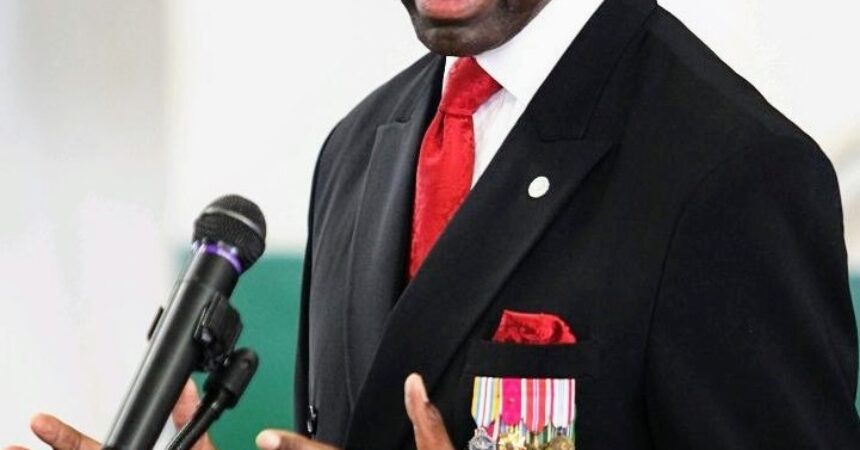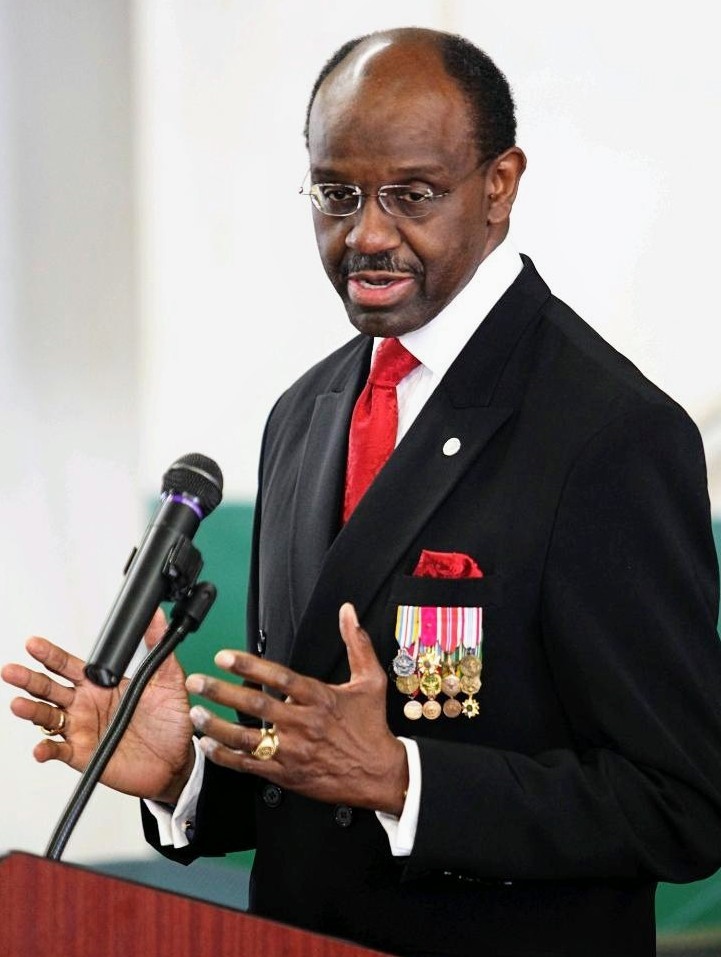
A distinguished veteran
Colonel Joe among 20 inducted into Veterans Hall of Fame

Photo submitted
By St. Clair Murraine
Outlook staff writer
Colonel Ronald Joe is being revered now. All his good works in the Army and his volunteerism as a civilian make him worthy.
There was a time as a teenager when he was at a crossroad that could have easily set him on a different path, though. His desire to attend the Military Academy at West Point and become a fighter pilot isn’t a story that gets told much.
It goes like this: After graduating from high school, he told his grandmother who raised him in Daytona that he would like to go to West Point. They applied, not knowing that a Congressional nomination was necessary for an applicant to be considered. That would require waiting a year, since Joe didn’t have the correct nomination initially.
He refused to sit out a year, attending FAMU instead. He was a drum major in high school and figured he had a shot at becoming a Marching 100 member. That didn’t pan out either, but Joe decided to stay at FAMU and opted to join the Reserve Officer Training Corps college program.
On graduation day, he left as a full cadet colonel and went into the Army as an officer. After 30 years of service, including a stint in Vietnam, Joe left with the rank of colonel.
Joe started telling that back story by saying of his choice of the military, “I thought it was the fairest part to our society.”
Recently Joe was rewarded for his career choice when he was inducted into the Veterans Hall of Fame along with 19 others. They include Tallahassee residents Claude Shipley and Norman Thagard.
Shipley is president of the Tallahassee branch of the Military Officer Association of America and Thagard is a physician and astronaut.
The induction ceremony took place on a YoutTube presentation, with Gov. Ron DeSantis and members of his cabinet acknowledging the inductees. A perpetual plaque of the inductees will be placed in the Capitol building.
“I’m extremely honored,” Joe said. “I think it’s a tremendous honor to be there in the hall perpetually.”
The honor is presented by the Florida Veterans Foundation in conjunction with the Florida Department of Veteran Affairs.
Joe, 76, might have already been inducted had it not been for his modesty. He’d met all of the criteria — community service, mentoring young people, serving in several civic roles and always advocating for veterans long after leaving the Army in 1996.
“He is a good role model,” said Col. Washington Sanchez, who first nominated Joe for the induction. “There is no doubt about it. He is the kind of guy who deserves recognition.”
Joe has inspired others to join some of the causes that he supports, including advocating to end homelessness among veterans. He’s also changing the lives of young people in his role as a mentor with the 100 Black men of Tallahassee, an organization that he once served as president.
“It’s infectious when you find out that you can do something that’s needed; working with others or working with students, especially Black students who often times aren’t well motivated,” Sanchez said. “They don’t see a lot of role models that they can emulate. With him, they see a role model and say I’d like to be like that guy.”
Despite the many hats that Joe wears, even when he was the driving force behind organizing the FAMU homecoming parade and serving as president of the local FAMU alumni association, Joe’s responsibility as a family man never waned. He and his wife of 53 years, Lanita, raised their only son Ronald Joe II. Now they have a granddaughter and a great granddaughter in the mix.
Joe grew up as one of four children. He was raised by his grandmother from infancy, while his parents and siblings lived 50 miles away in Titusville.
As a teenager, Joe said he witnessed segregation daily. For instance, he recalled collecting time sheets from workers on two sites where schools were being built. He noticed that the school that was being built for Blacks didn’t have the same amenities as the one for Whites.
It prepared him for some of what he’d see when he served in Vietnam as a tank commander.
“Everybody had to do his job so that the crew could survive,” Joe said. “We couldn’t worry about whether the gunner who might be Hispanic or the driver who might be Black or the tank commander, who was me, was Black. We couldn’t be worried about what our colors were.
“It was real combat.”
Since his days in the military, Joe has influenced hundreds of young people to join while heading up the ROTC program twice as professor of military science. During the early 1970’s his class included the first group of females in the ROTC program.
Donna Barron was one of the early graduates, who went on to serveseven years of active duty and three in the reserves. Admittedly, it took some coercing for her to join the ROTC before Joe convinced her that she could beat the challenge.
“I saw it as a challenge and became very competitive,” she said, praising Joe for being persistent while setting an example.
“As an officer, you can’t just talk about it,” she said, referring to the good she sees in Joe. “You have to walk it or show it. You’ve got to actually do it in order for somebody to believe in you.”
As a member of the 100 Black Men mentoring committee that Joe led, she’s seen first-hand how he changed lives.
“He’s always been very methodical,” she said. “He is disciplined and he has integrity. So yes, he has been a very inspiring mentor for me.”
In his effort to end homelessness among veterans, Joe has been able to galvanize several others to join the cause. The effort is being driven by Joe’s willingness to serve wherever he is needed, said Col. Ray Mobley, who has a lengthy relationship with him.
“It is real,” Mobley said of the homeless situation. “It’s not made up. You see veterans that are homeless. You see veterans that are having medical problems and other kinds of problems.”







